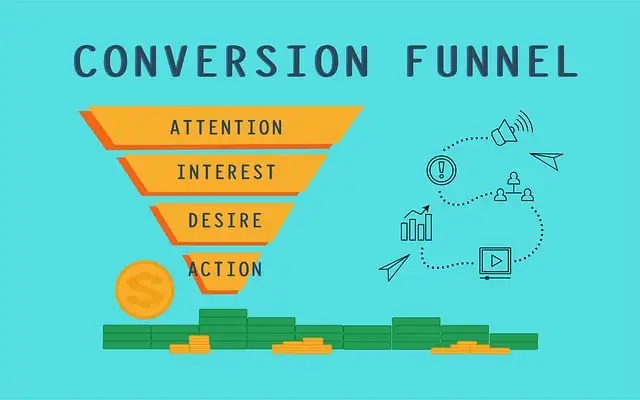A sales funnel—also known as a conversion funnel or a marketing funnel—is basically a visual representation of the different stages a prospect goes through before converting. Within the context of search engine optimization, converting could be anything from purchasing a product to signing up for a newsletter to simply accessing a specific page on your site. Most funnels consist of some version of the following stages:
- Awareness. People at this stage may or may not know about your company. This is where the majority of your prospects start and where most will likely remain.
- Interest. These prospects are intrigued but not necessarily hooked just yet. They’ve probably spent a bit of time on your website looking at what you have to offer.
- Consideration. People at this stage are doing their research into both your company and its competitors in an effort to decide who to choose.
- Decision. The tipping point. These prospects are on the verge of converting.
- Conversion. The people at this stage have done what you wanted them to do, but you aren’t finished yet. Now you need to put time and effort into nurturing a relationship with those customers in order to keep them loyal—and maybe inspire them to tell their friends and colleagues about your business, too.
But what does any of this have to do with SEO, exactly?
A great deal, actually. For each page on your site, and for each keyword, consider your target funnel stage. A “how-to” guide likely targets the top of the funnel. These are people interested in what you offer. However, they aren’t ready to buy yet.

Different stages of the funnel also require a slightly different keyword strategy, as noted by SEO expert Neil Patel:
- Top-of-funnel content typically involves long-tail keywords or questions that may lack the necessary traffic to appear in any keyword research software. Tools and sites like Answer the Public, Infinite Google Suggest, Quora, and Ubersuggest are invaluable at this stage.
- People in the middle of the funnel are strongly considering making a purchase and likely researching different options. At this stage, you’re generally focusing on long-tail keywords, though understanding the questions people are asking about a particular topic is still incredibly important.
- People at the bottom of the funnel are one step away from converting. Keyword research is less important at this stage than understanding your audience’s intent. You need to ask what they want to know about your business and its products. What information will cause these prospects to tip over to customers?
So, where does SEO fit in your business’s sales funnel? The simplest answer is everywhere. You can optimize for every part of the funnel. In fact, you really should. This ensures you can attract visitors. Then, you can hook them. Finally, you can guide them toward a sale.



